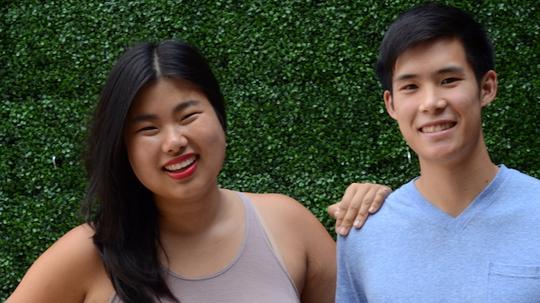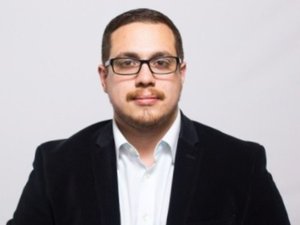
While trying to balance their schedules as Georgetown University students, longtime friends Ann Yang and Phil Wong had an idea for what to do with all of the imperfect produce in the world—like those tomatoes that aren't perfectly round or melons that are just a bit too brown—that gets thrown away each year because people don't buy it.
They would turn it into juice.
So one day they went to the farmer's market, bought a few misfit peaches and borrowed a blender from someone Yang babysat for and got to work. That was two years ago, and that small juicing operation eventually turned into Misfit Juicery. Since then, the two have expanded their business to New York City and been accepted into the Chobani Food Incubator, a six-month program hosted by Chobani for small food startups that starts this week. Oh, and they also graduated from Georgetown.
We consider ourselves friends first and foremost and business partners second.
What's your founding story?
Phil: Well, we met on OkCupid one day about two years ago... Nah, nah, that was a terrible joke. We get asked all the time if we're dating. And Ann always says that if we had a dollar for every time we were asked that we would be fully funded.
But we started as college students at Georgetown, both really interested in food issues. We've been really good friends for a while. We consider ourselves friends first and foremost and business partners second.
Basically, we saw this huge issue with food waste in the United States because 20 billion pounds of produce are going unharvested or unsold every year. And a lot of that is just because people don't want to eat things that look a little weird—like carrots that are curved or apples that are a little dimpled. So to combat that we started making cold-pressed juice basically out of my college apartment with misfit peaches from the farmer's market and a blender that Ann borrowed from the women she babysat for. And that was really the beginning.
What does your business model look like right now?
Phil: So we've got this really awesome partnership with Baldor, and they're the leading produce distributor in the Northeast, so we're both sourcing from them, and they're also distributing us, which is a great partnership.
But outside of that we're also working with a bunch of farmers and farmer cooperatives and distributors and that's basically where we're getting all of our food and veggies from.
On the distribution side, we got people in D.C., like Glens Garden Market, Dolcezza, Philz Coffee, that we really love. And in New York, we've also got Eataly and Foragers (Market) in Dumbo.
Do you have plans to expand to other markets outside of D.C. and New York?
Ann: Yes, so we started in D.C., and we expanded to New York City in April, and those two cities have kept us busy for a really long time. Both of these cities have a lot of opportunities, and then the next city we would go to is Boston — but that won't be for a while.
When you were starting what challenges did you face that were unexpected?
Phil: I mean, we could sit here and talk about that for days, honestly. We walked in certainly knowing the impact we wanted to have from the very start, and the kind of culture we wanted to build. But beyond that there was very little expectation on our part. We had never started a company before. At the end of the day, we're total amateurs.
We had never started a company before. At the end of the day, we're total amateurs.
How did it help to be on Georgetown's campus while starting this?
Phil: We really do see entrepreneurship as a community endeavor. From the very start, we had friends helping us juice seven nights a week, like instead of doing our homework. And we started selling in student-run coffee shops and a salad shop on campus, and there are people who really took a bet on us despite having a very, very preliminary product — you know, in mason jars.
And we got our first funding from a pitch competition on Georgetown's campus. So in every single sense, we couldn't have without our friends, our customers, our mentors at Georgetown, even to this day.
What was it like running this company as a student? How do you even balance that or deal with it?
Ann: I think that you attempt to balance it, and then at some point you just give up, and there's no balance at all. I feel like it's like dealing with the humidity in D.C. in the summer: At first you're like trying to avoid it, but at some point, you accept the humidity for what it is and you sweat all the time.
I feel like it's like dealing with the humidity in D.C. in the summer.
It's crazy and horrible, but at the end of day, being a student and doing this provided a comfortable safety that we needed to get the idea off of the ground. So in that way, as a student, there are people who are there to help you.
Phil: Like we would juice until like midnight, and then we would turn out deliveries at 6:30, 7 a.m. and then go to class. We both had very understanding and lenient professors along the way, as well as friends who would just lend a hand at the most inconvenient times for them. So the community's been critical to us surviving college.
Congrats on being accepted to the Chobani Food Incubator. What did it feel like to be accepted? And how did you find out?
Phil: It starts next week, which is very soon. So we were a little out of it when we found out. We had just pitched in San Francisco at an angel group and then we took a red-eye back to D.C. to pitch at an angel group the next morning in D.C. And Chobani had told us that they needed one last call with us that afternoon, and we were like "Oh my God, we're going to be zombies. Can we please reschedule this?" and they were like "No, we need to do it this afternoon."
And Ann, on the plane ride back, she turned to me and she's like "I think they're going to tell us that we got accepted," and I was like "No, no way." We got on the phone call, and that's what it was.
Ann: So I'm just going to note that I'm always right.
Phil: Yeah, if I hadn't figured that out in two years time, that probably doesn't bode very well for me. So yeah, needless to say, we were a little dazed and confused when we found out. But it was a pretty awesome feeling and validation for everybody who's been on the journey with us.
When you get through this what do you hope to gain and takeaway?
Ann: I think Chobani is a great example of a good food company that made it big and made it nationally. They're grossing over a billion dollars annually. I think that when Chobani started people were like "Oh, what is this weird, extremely plain protein yogurt." And they've proven that really good food concept really can be accepted by the mass market.
We're all at different stages, but we're all facing very similar problems. I think that the community that that provides, and working with Chobani, who is dealing with problems at a way bigger scale than we are, I think that will be helpful.
Most people come in as idealists, and I don't think that's the case for all cities.
What do you think makes innovation in D.C. unique?
Phil: More broadly, one thing that's pretty unique about D.C. is that no matter where you fall on the political spectrum, most people come in as idealists, and I don't think that's the case for all cities. I've kind of taken that for granted having spent all of my adult life in D.C. In one sense it might seem naive, but in another sense it's just an openness to possibilities that I haven't seen elsewhere.
Ann: I think what Phil said is right. I think people move to D.C. because some part of them wants to make that critical change to change the world, and you get here as an idealist, as Phil mentioned, and then all these things happen and you get a little bit jaded, but at the end of the day, there's a certain level of emphasis on social justice and consciousness in D.C. that doesn't exist in other major cities.
The biggest forces of growth in our company have been when we've been honest about when we've needed help.
What advice do you have for other entrepreneurs?
Phil: For me, it's really be honest with yourself. It's really easy to get down on yourself when you face criticism about your idea or what you're working on, and that's just natural. It's not always going to be pretty, and that's just the nature of things. But if it's really something that you're passionate about you think has legs.
Ann: For me, it's just to be vulnerable. I think that in the startup world, all the conversations are "Oh, we're doing really awesome," and "Everything is going super well," which is what I feel like people think they're supposed to say. But in reality you have to be more vulnerable. I think that the biggest forces of growth in our company have been when we've been honest about when we've needed help.




